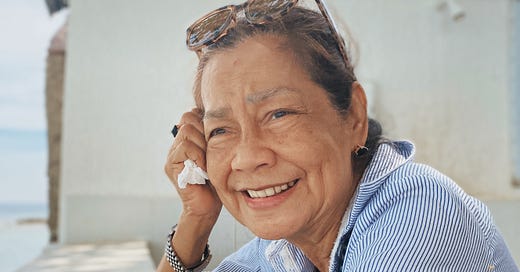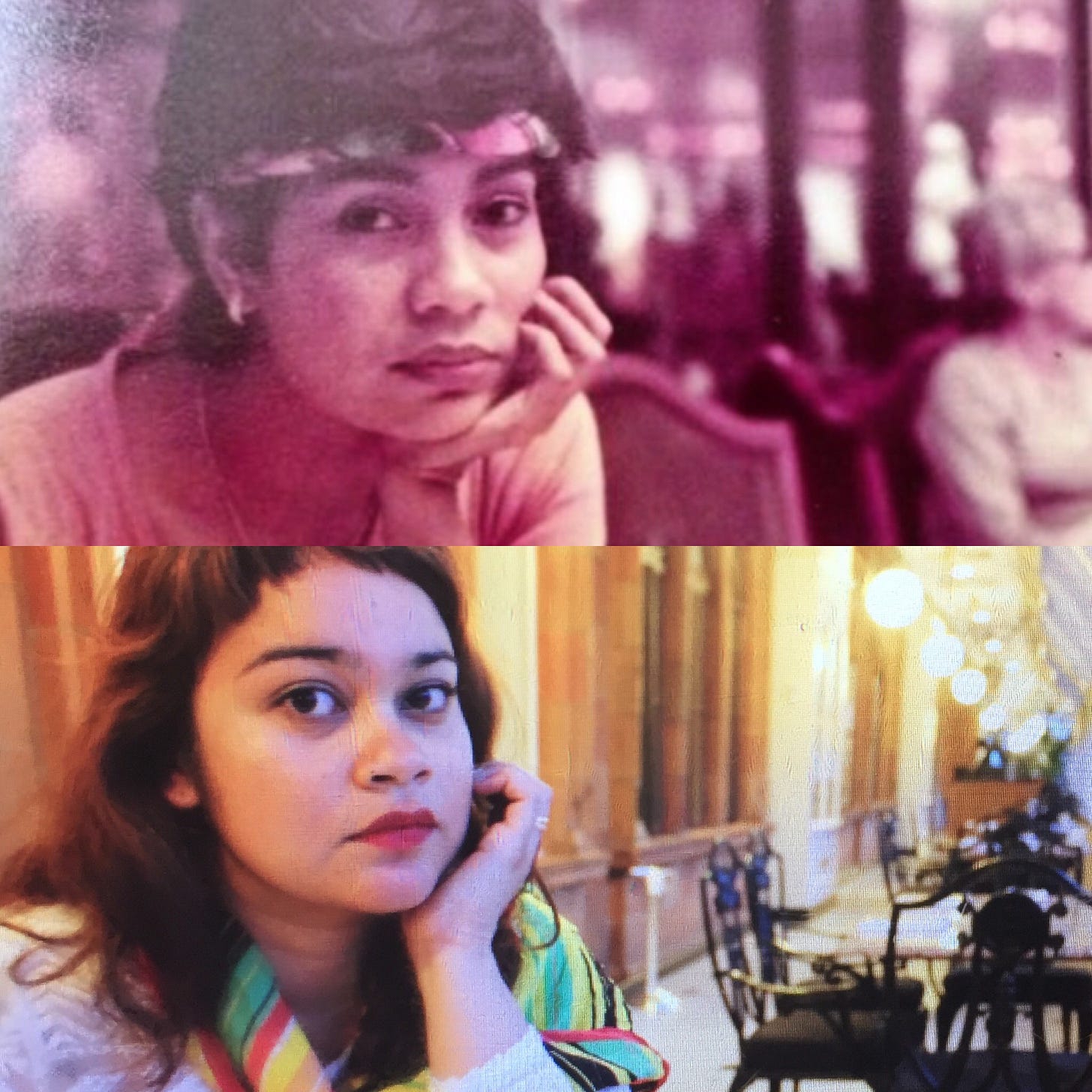

Discover more from Letters by Deepa
No. 26 | Coming home, coming out
I came out to my mom about my open marriage. Here’s how it went down.
Seven years into my open marriage, nearly three years into my relationship with my boyfriend, and two years into the writing of my book, I decided: it’s time.
Having The Talk with Mom was on my to-do list for my first homecoming since the pandemic, along with “stock up on barako coffee” and “book El Nido getaway.”
If the book takes off—and I not only hope it will, but now have enough confidence in myself to believe that it will—she’s going to need to know. And I wanted her to hear it from me.
First of all: what you should know about my mom
My mom is 73, Filipina, and a Pisces. Widowed at age 36, retired but constantly managing, project-ing, doing, she is the certified cat lady of her community, caring for an ever-growing number of strays that drives my sister crazy.
My mom is not tech-savvy. She doesn’t know her own Hotmail password, let alone that I have an email newsletter. Though I’ve lived overseas for 15 years, she still can’t find the answer or volume buttons on whatever platform we use to call (we’ve gone through Skype, Viber, FaceTime and Whatsapp) and she still asks me what time it is when I call her. She browses my Instagram posts and stories only infrequently, so I’m not sure how much of my life she’s seen or absorbed.
What my mom is, is unconventional.
We went to Catholic schools and attended Sunday mass because Mom felt it was the right background to give her daughters. But her own beliefs flowed along alternative paths. She was doing New Age spirituality long before it was hip to be witchy on Instagram and Tiktok: crystals, moonbathing, spells, Tarot, astrology, angels, you name it.
Our house was the hangout of hippies, gay psychics and crystal shop owners, where sandalwood incense mingled with fresh flowers and holy water, on an altar where Ganesh danced around Saint Michael and the Sacred Heart. If the cult of yoga had found its way to Manila when Mom was at the peak of her powers, I’m positive she would have hopped onboard. She has always been more spiritual than religious, more intuitive than moralistic.
My mom is also non-judgmental.
When I went on my first date with a boy at age 15, Mom was the first to hear about it. I remember coming home to her at the door, barefoot and smiling, before we sat together on the stairs and I spilled my heart out. There wasn’t much to tell: he brought me to the Ateneo Grade School fair, then asked his mom for money to take me out to dinner at Angelino’s. (Oh, tender youth!) We didn’t even kiss or hold hands. Later, when there was more to tell, there would also be more to hide. But I knew I could talk to her about anything, even if I didn’t always choose to.
My mother drives me crazy in many ways. Our relationship is far from perfect. But I have always felt safe with her. It is a kind of trust and openness that I hope to cultivate with my own daughter.
Through many milestones that would faze a Filipina mother, Mom met them all with the same non-judgmental attitude. My first visit to Marlon in Singapore (which implied that we were having—gasp! Scandal!—pre-marital sex). My first tattoo. (She objected to the second, but I was already married and living abroad. What could she do, ground me?) My instantaneous, unusual connection with Marcelo. Talking to her about that, I became aware that she believed such deep connections could exist beyond the bond spouses share, without threatening it.
When I came home to the Philippines for the first time in nearly three years, I was unsettled by the toll the pandemic had taken on Mom’s health—physical, emotional, and mental. Some of her responses and behaviors struck me as unpredictable and alarming. To a child, any change in a parent is a cause for alarm.
Was she the same mother I had left behind in 2019? Or had I just become a whole other daughter? Could I trust in our bond after all this time and distance, even though both she and I had become almost completely different people?
Jam-packed days, flaring tempers, oscillating emotions, and fatigue quickly caught up to both of us. I was freaking out as we approached the end of our three weeks back home. I didn’t know exactly what I would say, or how to start. I only knew we needed a short interlude of quiet, stress-free time alone, an activity to provide neutral ground, and an opening.
What you should also know about Mom is that she is my style icon, with the eye of an aesthete and the heart of an artist. Her love for clothing and accessories means that our family of women has always bonded over them.
My childhood was filled with countless visits to the fabric store and after-school shopping sprees at Benetton and Cinderella. In my college years, we modeled clothes for each other, dipping into each other’s closets on the daily so that classmates commented on how I never seemed to repeat an outfit.
Whenever I fly home, a complete summer wardrobe sits waiting for me and my daughter, shopped by Mom to feel closer to us in our absence.
Clothes are Mom’s love language, guilty pleasure and safe zone. So it wasn’t surprising that we found each other there, three days before I was to fly back to Amsterdam.
I was repacking for the homeward journey when Mom came in with some offering or other: a thrifted Hermes scarf, a chunky string of barok pearls. She sat on the bed as I made room in my suitcase for her gifts.
Then she noticed two shirts on top of my pile. “Oh, is this the barong you found for Marlon?”
For a summer wedding upon our return, my husband Marlon wanted to wear a traditional Filipino garment called a barong Tagalog—a loose-fitting formal shirt for men, made of fine, translucent jusi or pineapple silk to keep cool in the tropical heat. Coming across a selection at SM Kultura, Marlon bought one for himself, and I decided to buy one for my boyfriend, Conor.
Like the men in my life, the two garments couldn’t be more different. Marlon’s was earth-toned and elegant with subtle traditional embroidery, while Conor’s was dip-dyed in bright turquoise and handpainted with graphic patterns.
Mom noticed. “And whose is this?” she asked, one hand on the turquoise silk.
There it was. She gave me the opening. Now I had to take the leap.
“Mom, there’s something I need to tell you.”
Then I was winging it: no strategy or script, only years of trust and safety inscribed into my body, written with the blood that flows through her veins and mine.
No matter what happened next, no matter how she reacted, something in me knew I would always be her daughter, and she would always be my mother.
“For the past six—no, seven years, Marlon and I have had an… understanding.”
She waited.
“We’re still happily married, very much so, we just have an understanding that we can… see other people sometimes.”
Then my mother took the words right out of my mouth.
“Yes,” she said, nodding. “The two of you love each other, you’re committed to each other, but you have”—she began to gesture, loose and wavy, rummaging through a formless ether with her hands—“you have other people in your lives, I don’t know what you call it, basta—“
“An open marriage,” I said, astounded.
“Yes, I don’t know, basta, you’re… you’re…” she said, impatient now, looking around as if the word was in the atmosphere, on the bed, in the half-open suitcase.
“You’re free!” she finished.
I’m free.
“I know you, Deepa. I can feel you,” she said. “Even if I don’t know, I know.”
From then on, the rest was easy. I told her about Conor, that the turquoise barong was for him. She asked if he was married or single, and if Tala knew. Even more remarkable, she said started feeling something was different about three years ago, (which is about the time that Conor and I met) but didn’t want to ask.
She said: “As long as you’re happy and your relationships let you be you—let you be more of who you are—then I’m happy for you.”
Then the tears came: tears of relief and appreciation for this woman who saw me, understood me, knew me. For all we want—as children of our parents, and as humans making our way in this life—to be seen, heard and known for who we truly are.
If you are polyamorous and/or queer and were hoping for advice on how to handle your own coming-out conversation, I’m sorry that this is a bit thin on wisdom. I’m not very strategic about most things; I feel my way through, and I don’t always get it right.
It helps to wait for the right time and moment. What that looks or feels like for you depends on your person, your relationship with them, and the world you share. Just trust that no moment is unsalvageable: more moments will come after that, every one of them a chance for something new.
All I have is gratitude for the way it turned out, knowing that not everyone is so lucky. I wish more of us were.
All I have is my own story.
And one remarkable mother.
That was a long one. Thank you for reading!
If you’re in Amsterdam on 30th of November, I’d like to invite you to Body Electric Presents Vol. 3, a night of music, poetry, and spoken word at Toekomstmuziek in the Houthavens. I’m reading excerpts from my book, so please come! Get your tickets on Eventbrite now.
Here in Amsterdam, winter’s first real kick has me pulling on the woolies and longing for lingering, lazy mornings in the warm cocoon of a duvet. But we soldier on, even as the darkening days—and our bodies—urge us to slow down.
Life is out there, and I want to live it.






I love this. The perfect response from your wonderful mom.
Pretty cool mom! I just saw you on the London's writer's hours. I'm a Brazilian living in Gent, Belgium. :)